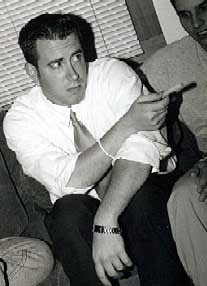-
- Dean admits stand on gay rights may cost votes
- Gay-rights activists seek stronger hate crimes law
- Group says South gets short shrift in AIDS money
- Gov. Davis signs AB205
- Law schools sue Department of Defense
- Former San Francisco health commissioner prosecuted for HIV infection
- IU chancellor condemns professor’s anti-gay web log
- It’s not your father’s fraternity
- National News Briefs
- World News Briefs
national
It’s not your father’s fraternity
Gay frats gaining popularity
Published Thursday, 25-Sep-2003 in issue 822
CHARLOTTESVILLE, Va. (AP) — By the end of the year, 22-year-old Anthony Whitten hopes to persuade 20 men to join the University of Virginia’s first gay fraternity, a group he wants to transform into one of the South’s few nationally affiliated collegiate gay brotherhoods.
The group calls itself Out on Rugby, a reference to a neighborhood street lined with brick frat houses off the campus of this traditional school, where male students still wear ties to football games and women were not even admitted into most academic programs until 1970.
About 30 percent of the current student body is affiliated with a fraternity or sorority. For Whitten, Out on Rugby fills a gap in a Greek system that he says traditionally has been perceived as “heterosexist,” and uncomfortable for gay men. The new group creates a community not only for them, but also for what he calls “progressive” straight men who aren’t fazed by others’ sexual orientations.
“We don’t really have any criteria,” Whitten said. “Anyone who is interested and wants to be a part can join.”
The group of about 10 men in Charlottesville is part of a burgeoning number of similar clusters nationwide trying to join one of two national gay fraternities, said Eric Van Sant, vice president of expansion for Delta Lambda Phi, the larger of the two.
The fraternity has 18 chapters, about 300 members and nine colonies, or groups in the process of becoming chapters. In addition, 13 interest groups like the one at U.Va. have recently contacted the fraternity about starting the chapter-building process, the most in any single year, Van Sant said.
The other national fraternity, Alpha Lambda Tau, has three chapters and one colony, according to its web site.
By contrast, there are 66 traditional fraternities with roughly 5,300 chapters on more than 800 campuses nationwide, according to the North American Interfraternity Conference.
Shane Windmeyer, editor of the 1998 book Out on Fraternity Row: Personal Accounts of Being Gay in a College Fraternity, said U.Va.’s group is important precisely because it’s taking root at a traditionally conservative school.
The lack of resistance to it shows that “two men holding hands is no longer seen as an evil, counterculture, abnormal thing,” added Justin Wienckowski, a senior at Virginia Tech and a founder of Virginia Out, a statewide organization of gay campus groups.
Sean Lloyd, president of the Delta Lambda Phi chapter at the University of South Alabama in Mobile, says his fraternity gives the eight brothers — including one straight one — and four pledges a place to find acceptance and friendship, especially if they are struggling with identity problems, without an accompanying pressure to have sex.
“We’re not a dating service,” said Lloyd, 27. He said the fraternity has had a few problems with failed relationships, and officially discourages dating between brothers. “You’re here because you believe in the ideals of Delta Lambda Phi, not because you’re looking for your next boyfriend or your next sexual partner.”
Whitten, who is studying to be a teacher, is president of Out on Rugby. At this point, the group is simply a university-affiliated organization going through the probationary period required for it to become part of the Multi-Cultural Greek Council. If Out on Rugby is accepted by the council in December, it can begin the process of becoming a chapter of one of the national fraternities.
While the group has not generated any organized opposition, the president of U.Va’s Interfraternity Council has objected to the name, saying it erroneously suggests the group is affiliated with U.Va.’s traditional fraternities, many of which have chapter houses on Rugby Road.
“It’s inappropriate because they don’t have a house on Rugby, and there should be no mention of Rugby,” said senior Ryan Ewalt. “In the common fraternity man’s eyes, it’s a misnomer.”
But for gay fraternities, the ultimate goal is to get more chapters included in Interfraternity Councils, the student-run groups that govern schools’ Greek systems, Van Sant said.
“Then we’ll have a seat at the table with all the other fraternities to demonstrate that we’re all the same,” he said.
Still, the fact that some gay men say they often haven’t felt comfortable in traditional fraternities and feel a need to start their own, suggests that the groups are not all the same.
“I thought it would be neat to be in a fraternity, but I didn’t see myself fitting into that cookie-cutter type,” Lloyd said. “With us, you can bring your boyfriend to events, you don’t have to try and find a girl to take. It’s that kind of thing.”
|
|
Copyright © 2003-2025 Uptown Publications


